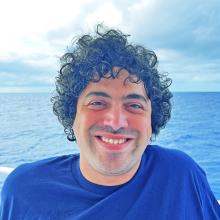
David Casagrande
Tell us about your work/research. What kinds of things do you do?
I am the lead engineer for URI's Deep Autonomous Profiler (Lander), and also responsible for a number of other URI vehicles, including the Wire Flyer towed profiler, a Lagrangian float and camera platform, and a growing fleet of autonomous kayaks. A key focus for autonomous vehicles is reliability and fault tolerance - if something breaks, which it frequently does in the ocean, we must still be able to operate, or at minimum get home.
My primary research interest is underwater and surface vehicle navigation, especially in low-information environments like underwater vehicles without GPS or USBL sonar tracking. I also work on bathymetric mapping with sonars and optical sensors, and low power electronics.
What sparked your initial interest in your career?
I've always been interested in robotics and the ocean, growing up in Rhode Island swimming, fishing, and sailing all summer. I didn't initially choose to study marine robotics, starting instead in computer science and electrical engineering, but it should have been obvious to me that I'd end up here.
Who influenced you or encourage you the most?
My high school robotics coach, who spent many late nights and weekends working with us to prepare for competitions, including my first ROV.
What element of your work/study do you think is the most fascinating?
I call myself an Ocean Engineer, or Electrical Engineer, but most of my work falls under Systems Engineering - making the many components of a complex system work together. A complete robot is often too complex to think about as one thing, but when you break it down into individual sensors, power supplies, computers, and actuators like thrusters and rudders, each part is actually pretty simple. Bringing them all back together and having the complete system work on the first try (or second, third, fourth...) can feel like magic.
How did you get involved with the Ocean Exploration Trust?
The lab I worked in as a grad student supported camera and sonar systems on Hercules for more than a decade, which started many of the connections I've made in the oceanographic community. Like most modern research, this cruise involves multiple research institutes and organizations, taking advantage of specialized equipment and skills from each. In other words, networking!
What other jobs led you to your current career?
Growing up in the 90s I became interested in programming, particularly web development. My first few jobs were all related to this. Through college and grad school I was involved in ocean research and then robotics. After graduating I worked as an independent contractor and ROV pilot for a few years, before starting a full time position at the University of Rhode Island's Graduate School of Oceanography in 2017. I've never had a job outside of technology, other than a brief stint as a handyman - which is a lot closer to engineering than most people think, both involve solving interesting problems you've never encountered before.
What are your degrees and certifications?
BS Ocean Engineering - University of Rhode Island 2010
MS Ocean Engineering, focus on Marine Robotics - University of Rhode Island 2013
What are your hobbies?
Carpentry, off-grid electrical systems (including boats and RVs), and sailing fast.
What advice would you give someone who wants to have a career like yours?
Find someone working on something interesting, and get involved. Keep emailing and showing up when they ignore you. Research labs are always overworked and understaffed, and motivated students are always welcome. If you're a first year student who doesn't know anything yet, we'll teach you. Depending on the field, you can even get much of your education funded through research assistantships.
Expeditions
David participated in the following Ocean Exploration Trust expeditions:
